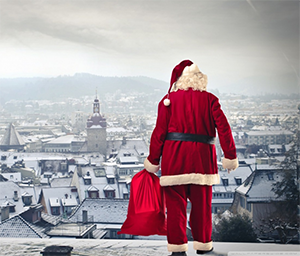

Santa Claus has been recognised and somehow celebrated in most parts of the world. In many western countries he is the chubby man who tries to stuff himself down the chimney to place presents under the tree on Christmas Eve. It is also common in those places to hang stockings above the fireplace so Santa can hide gifts inisde of them. Russia also thinks of this tradition differently: Father Frost, or as they call him, Ded Moroz pays you a visit on 6 December. He is often dressed in very cool blue colors to symbolise the freezing cold place he originates from. Father Christmas takes up many different forms and names according to the customs of each particular country or region. Canada and France call him Père Noël, in South America he is Papá Noel, while he is Padre Noel in Spain.
Customs are also different in connection with him according to the climate of the country. While in Europe and North America he arrives during the coldest winter days, the Southern Hemisphere welcomes him in the hottest summer. Countries like Australia or Brazil hold beach and garden parties for Christmas and Santa as December for them is like June for the north of the Equator.
Hungary also has very special traditions as regards Santa. We strictly celebrate his arrival on 6 December, so he does not bring his presents on Christmas Eve. He is commonly referred to as the joyous, white-bearded man wearing a red coat and trousers and white collars. He has a black leather belt and boots, and a huge red bag on his back full of presents for children. We call him "Mikulás" after Saint Nicholas, the saint he originates from, or "Télapó", as Father Winter, meaning that he is the kind old man who brings a little joy into the cold winter months. His arrival is traditionally connected to the virtues of kids: Santa makes a list and categorises children as "nice" if they have been well-behaved since his last visit, or "naughty" if they made or got into trouble.
As far as the procedure of the feast is concerned, children place their boots on the windowsill of the window of their bedroom. Kids cannot be curious, so they have to go to bed early as well-mannered kids do. During the night, Santa arrives down from the sky on his sleigh pulled by a team of reindeer. He never shows up all by himself: he is accompanied by a figure called "Krampusz", who is an elf-like creature, the embodiment of the devil. Originally, good kids receive fruits, candies and toys as a reward for the good behaviour. Bad children, on the other hand, are punished by "Krampusz", and only get potatoes, carrots, pieces of coal, onions and a "virgács", which is a bunch of twigs, symbolising spanking for bad behaviour. By the way, shoes must be polished and shiny, otherwise even good kids will not get their well-deserved gifts.
Parents arrange special celebrations for the arrival of Santa: kids learn special poems and songs which they can perform when he enters the room. Kids also write letters to him in which they tell him how good they have behaved and the presents they wish for.
Santa stays around until Christmas, when the Baby Jesus comes to bring happiness to the people. Children are very excited aboutthe arrival of the long-bearded old man, as he brings presents, temporary joy and signifies the approaching of Christmas. Unfortunately, Father Christmas has become heavily commercialised in the past decades. The quality and the size of his package depends of the financial situation of the family. People seem to forget about the true meaning of this feast, but hopefully this situation will improve in the future.
Source: angolingo.hu
Languages
Hungarian, English, German, Russian, French, Portuguese, Spanish, Swedish, Italian, Czech, Serbian, Danish, Bulgarian, Croatian, Slovakian, Polish, Romanian, Slovenian, Flemish, Belorussian, Catalan, Dutch, Turkish, Albanian, Ukrainian, Greek, Bosnian, Catalan, Estonian, Finnish, Latvian, Lithuanian, Irish, Maltese, Armenian, Arabic, Hebrew, Thai, Japanese, Chinese, Korean, Vietnamese
1x1 Translations Ltd.
1DayTranslation.com
Phone: +36 70 33 24 905
Email: info@1daytranslation.com
Skype: onebyonetranslation